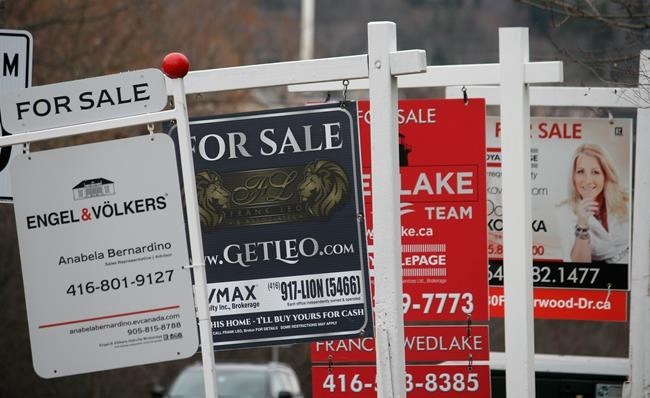TORONTO — July was a record-breaking month for Toronto real estate sales, as a nearly 17 per cent price spike did not stop homebuyers from making offers.
“Sales activity was extremely strong for the first full month of summer. Normally we would see sales dip in July relative to June as more households take vacation, especially with children out of school,” said Lisa Patel, president of the Toronto Regional Real Estate Board.
The board said 11,081 existing homes changed hands during July, 29.5 per cent more sales than July 2019 and a new record high for the month.
Average home prices are also up 16.9 per cent from a year ago, at $943,710, the board said.
Patel said there is evidence the home market is tightening — with buyers competing as homes are being sold faster than new listings are added to the market.
“Competition between buyers continued to increase in many segments of the GTA ownership housing market in July, which fuelled a further acceleration in year-over-year price growth in July compared to June,” said the board's chief market analyst, Jason Mercer.
Patel suggested that homebuyers and sellers have put off summer travel and are playing catch-up on their housing plans, after the City of Toronto entered Stage 3 of reopening from COVID-19 restrictions.
Davelle Morrison, broker at Bosley Real Estate Ltd., agreed that months in lockdown have given buyers time to think about exactly what they want in a home. Research done, buyers are coming to the market ready to sign on the dotted line, she said.
“People have had three months to sit and observe what they want for their living space,” said Morrison. “People are starting to recognize that the Toronto real estate market holds value. They thought there would be a crash, and they were waiting for one. The time period to get a deal was March and April, and it is over . . . so people aren't on the sidelines anymore.”
Nasma Ali, founder of One Group Toronto Real Estate, said sellers often spend winter months prepping their house to sell in spring, when the greenery will improve their curb appeal. The listings that usually crowd the market in March and April came all at once this year — in June.
Last summer, buyers would have been fatigued by the stressful process of making offers. Listings that hit the market in spring usually pile up a bit more by summer, she added.
But this year, that process has sped up, she said.
“Spring never came, and when June came ... I could feel the difference in demand. The demand was just on fire,” said Ali.
That raises the question of how long the pent-up demand will fuel the market, Ali says.
“People are always waiting for a crash, and now people are waiting for a crash in fall,” Ali says. “(Unlike in June,) houses are not selling with 10 to 20 offers. . . . . August is historically slow, people want to enjoy the last few weeks of summer and look again after Labour Day. ”
Morrison said that even among pessimists, she’s seeing a strong urge to move, with one client looking for a backyard in case schools close again in the future.
“People are saying, ‘We realized we won't be able to travel for the next couple of years, we need a getaway that’s local,’” says Morrison.
But both Ali and Morrison noted that the market for detached houses is different from the condo or rental markets.
TRREB said low-rise homes, especially outside the downtown core, led the upward trend, with overall prices jumping most in Durham, Orangeville and South Simcoe county. The bulk of sales for July were detached homes (5,633 sold) and condo apartments (2,423 sold).
“Condo sales downtown are slower and there are so many factors. The obvious factor is Airbnbs, which have flooded the rental market as more of those investors chose a one-year rental rather than selling,” said Ali.
“A lot of people are saying they are done with condo living. There is no immigration and that was a huge driving force of urban living.”
Morrison also said landlords are having a harder time filling rental spaces amid a greater supply of condos for rent, alongside unemployment among tenants. While mortgage deferral programs will end in the autumn, Morrison said she’s not sure how many houses will hit the market as a result.
As prices rose again in July, TRREB said it supports housing affordability measures that increase the supply of housing.
The real estate board reiterated support for building more “missing middle” housing, such as low-rise apartments and townhouses, as well as a provincial push for transit-oriented communities.
On the other hand, the board did decry any policy suggestion that capital gains tax should be applied to the sale of a principal residence, saying a tax would not help bridge the wealth-creation gap between renters and owners.
“The long-term solution to housing affordability in Canada, for both ownership and rental, is to ensure that there are adequate and appropriate types and tenures of housing available in the market,” said TRREB chief executive John DiMichele.
This report by The Canadian Press was first published Aug. 6, 2020.
Anita Balakrishnan , The Canadian Press



